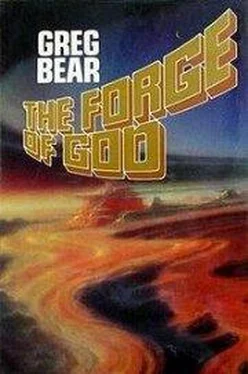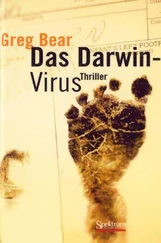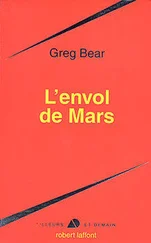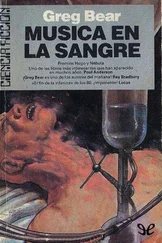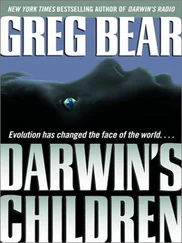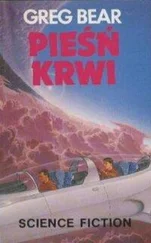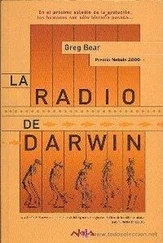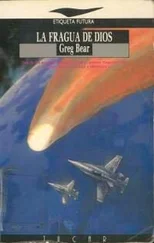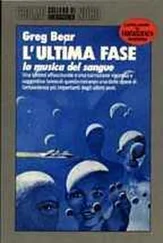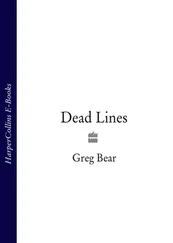“The Guest told me he believes in God.”
Arthur chose not to correct the President.
“From what I understand,” Crockerman continued, his face drawn, eyes almost frantic above a forced calm, “the Guest’s world was found wanting, and eliminated.” He seemed to be searching the faces of Arthur and those nearest to him for sympathy or support. Arthur was too stunned to say anything. “If that’s the case, then the agency of our own destruction awaits us inside this mountain.”
“We must have more cooperation from Australia,” McClennan said, clenching one fist and shaking it in front of him.
“They’re telling quite a different story down there, aren’t they?” The President began walking back to the trucks. “I think I’ve seen enough. My eyes can’t squeeze truth out of rocks and sand.”
“Making tighter arrangements with Australia,” Rotterjack observed, “means telling them what we have here, and we’re not sure we can risk that yet.”
“There’s a possibility we’re not the only ones who have ‘bogeys,’” Harry said, giving the last word an almost comic emphasis.
Crockerman stopped and turned to face Harry. “Do you have any evidence for that?”
“None, sir. But we’ve asked for the NSA and some of our team to check it out.”
“How?”
“By comparing recent satellite photographs with past records.”
“More than two bogeys,” Crockerman said. “That would be something, wouldn’t it?”
Trevor Hicks slowed the rented white Chevrolet as he approached the small town of Shoshone — little more than a junction, according to the map. He saw a cinder-block U.S. post office flanked by tall tamarisk trees and beyond it, a stark sprawling white building housing a gas station and grocery store. On the opposite side of the highway was a coffee shop and attached to it, a spare building with neon beer advertisements in its two small square windows. A small sign spelled out “Crow Bar” in flickering light bulbs — a local tavern or pub, obviously. Hicks had always been partial to local pubs. This one, however, did not seem to be open.
He pulled into the post office’s gravel parking lot, hoping to ask someone if the coffee shop was worth a visit. He didn’t trust local American eateries any more than he liked most American beer, and he did not think the appearance of the coffee shop — or cafe, as it styled itself on an inconspicuous sign — was very encouraging.
It was almost five o’clock and the desert was already chilly. Twilight was an hour or so away and a mournful wind blew through the tamarisk trees beside the post office. His morning and afternoon had been frustrating — a rental car breakdown fifty miles outside Las Vegas, a ride in the tow truck, arranging for another car, and as a lagniappe, a heated conversation with his publisher’s publicist when he thought to call and explain his missed interview…Delay after delay. He stood near the car for a moment, wondering what sort of idiot he was, then chose the glass door on his right. As it happened, that led him into the local equivalent of a branch library — two tall shelves of books in a corner, with a child-sized reading table squatting before them. A counter stood opposite the shelves, and beyond it the furniture and apparatus — so a small plaque read — of the Charles Morgan Company. The door on the left led into a separate alcove that was the post office proper. The air of the office was institutional but friendly.
Beyond the counter, seated before an old desktop computer, was a stately woman of about seventy-five or eighty years, wearing jeans and a checked blouse, her white hair carelessly combed back. She spoke into a black phone receiver cradled between her neck and shoulder. Slowly, she swiveled on her chair to glance at Hicks, then raised one hand, requesting patience.
Hicks turned to examine the books in the library.
“No, Bonnie, not a word,” the woman said, her warm voice cracking slightly. “Not a word since the letter. I’m just about at my wits’ end, you know. Esther and Mike have quit. No. I’m doing fine, but things are kind of sliding here…”
The library held a fair selection of science books, including one of his own, an early popular work on communications satellites, long since out of date.
“It’s all crazy,” the woman said. “We used to worry about Gas Buggy, and all the radiation from the test site, and now this. They closed down our meat locker. It’s enough to scare the hell out of me. Frank came in with Tillie yesterday and they were so nice. They worried about Stella so much. Well, thank you for calling. I’ve got to start closing up now. Yes. Jack is in the warehouse and he’ll walk me down to the trailer park. Thanks. Goodbye.”
She replaced the phone and turned to Hicks. “Can I help you?”
“I didn’t mean to interrupt. I was wondering about the coffee shop across the street. Is it recommended?”
“I’m not the one to ask,” the woman said, standing.
“I’m sorry,” Hicks said politely. “Why?”
“Because I own the place,” she answered, smiling. She approached the counter and leaned on it. “I’m prejudiced. We serve good solid food there. Emphasis sometimes on the solid. You’re English, aren’t you?”
“Yes.”
“On your way to Las Vegas?”
“From, actually. Going to Furnace Creek.”
“Might as well turn back. Everything’s sealed up that way. The highway’s closed. They’ll just turn you around.”
“I see. Any idea what’s happening?”
“What’s your name?” the woman asked.
“Hicks. Trevor Hicks.”
“I’m Bernice Morgan. I was just talking about my daughter. She’s being held by the federal government. Nobody can tell me why. She writes to say she’s well, but she can’t say anything about where she is, and I can’t talk to her. Isn’t that crazy?”
“Yes,” Hicks said, his neck hair prickling again.
“I’ve got lawyers all over the state and in Washington trying to find out what’s going on. They might think they’re tangling with some small-town yo-yos, but they’re not. My husband was a county supervisor. My father was a state senator. And here I am, talking your ear off. Trevor Hicks.” She paused, examining him more closely. “Are you the science writer?”
“Yes, actually,” Hicks said, pleased at being recognized twice in as many days.
“What brings you out this way?”
“A hunch.”
“Mind if I ask what sort of hunch?” Clearly, Bernice Morgan, for all her warm voice and hospitable manner, was a tough-minded woman.
“I suppose it could connect with your daughter,” he said, deciding to go for broke. “I’m following a very thin trail of clues to Death Valley. Something important has happened there — important enough to draw your President to Furnace Creek Resort.”
“Maybe Esther isn’t hysterical,” Mrs. Morgan mused.
“I’m sorry?”
“My store clerk. She says some men talked about a MiG crashing in the desert.”
Hicks’s heart fell. Was that all it was, then? Some sort of unusual defection? No connection with the Great Victoria Desert?
“And Mike, he’s a young fellow who worked in our service station, he says some men came to the store in a Land Cruiser and talked to my daughter. They had something covered up in the back. Mike sneaked a look when they took it around the rear and he thought it was something green — dead-looking, he said. Then the government comes in here and sprays this awful stuff all over the inside of my meat locker, closes it off, and says we can’t use it…We lost five hundred dollars in meat. They carted it away, said it was spoiled. Said the locker was contaminated with salmonella.”
Читать дальше
